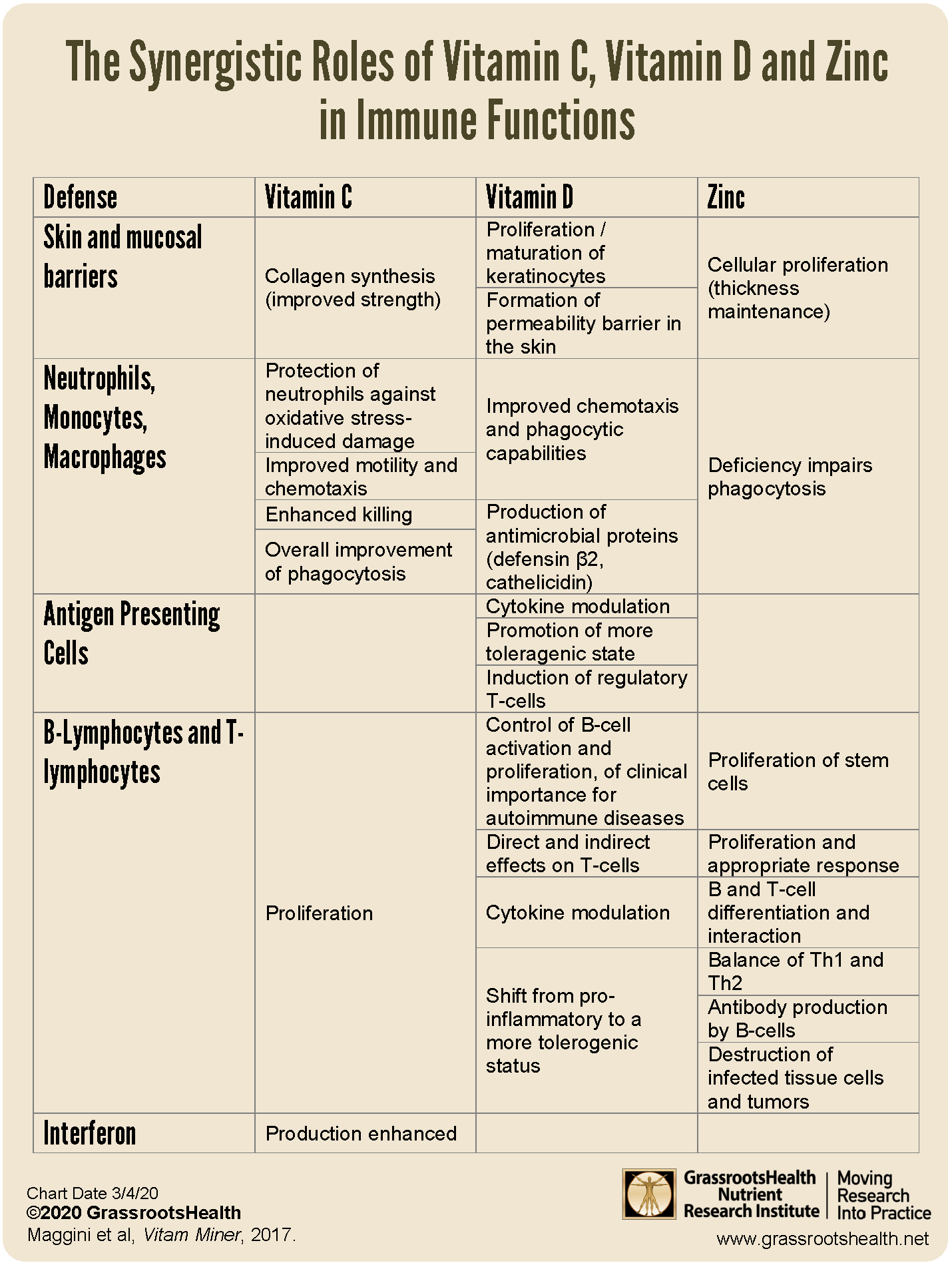Published on March 6, 2020
With growing, wide-spread concern about the novel coronavirus, it is essential to be taking the necessary steps to maintaining a strong and healthy immune system. We recently highlighted the many roles of vitamin D in the immune response. However, it is important to pay attention to other nutrients as well, such as vitamin C and zinc, as was the focus on a review published by Maggini et al.
“There is A Close Relationship between Nutritional Status and Immune Function”
 The authors state quite wonderfully, “There is a close relationship between nutritional status and immune function. Hence, immunocompetence can be regarded as a measure of adequate nutrition.” While there are certainly other nutrients that play major roles in immune system function, the authors chose to look at vitamins C, D and zinc, and their synergistic, central roles in how the immune system responds to upper respiratory tract infections, as well as how those roles are challenged by other influencing factors.
The authors state quite wonderfully, “There is a close relationship between nutritional status and immune function. Hence, immunocompetence can be regarded as a measure of adequate nutrition.” While there are certainly other nutrients that play major roles in immune system function, the authors chose to look at vitamins C, D and zinc, and their synergistic, central roles in how the immune system responds to upper respiratory tract infections, as well as how those roles are challenged by other influencing factors.
Vitamin C
Vitamin C has been noted in many studies to have a positive effect on upper respiratory infections, including decreasing the duration and severity of symptoms. It is known to be essential to a healthy immune response in the following ways:
- It is required for the synthesis of collagen, which helps keep the epithelial barriers (skin, lungs, etc.) strong
- Specific white blood cells rely on vitamin C to help stimulate their function
- The antioxidant activity of vitamin C is needed to counteract extremely high levels of oxidative stress that result from the inflammatory response, which can damage healthy cells and their proper immune response
Vitamin D
In our previous posts about vitamin D and the immune system, we describe in detail the role that vitamin D plays in the body’s initial defense against a pathogenic invasion as well as its complex role within the adaptive immune system, tying both together to clearly illustrate the full significance of vitamin D to immunity. In summary:
- Vitamin D allows immune cells and epithelial cells (such as those in the lungs and gastrointestinal tract) to increase their production of antimicrobial peptides, regulate certain immune cells, and reinforce the physical barrier for better response against infections; this is especially true for the airway epithelial cells in response to a viral infection
- Vitamin D is needed by certain white blood cells to help them recognize, bind to, and destroy pathogens in the body (through processes called chemotaxis, autophagy and phagocytosis)
- Vitamin D influences the gut microbiota and helps it maintain its immune modulating effects
- Vitamin D is needed to activate T cells, turning naïve T cells into primed T cells that are better able to respond to a pathogen, such as viruses
- Vitamin D influences T cell differentiation to induce lower levels of inflammatory cytokines and higher levels of anti-inflammatory cytokines
Zinc
According to the authors, “impaired immune functions due to inadequate zinc status may be the most common cause of secondary immunodeficiency in humans.” Zinc deficiency impairs the capacity of many different immune cells to carry out their functions. Some of zinc’s roles within the immune system include:
- Zinc is a necessary co-factor for the development and function of many different types of immune cells, including macrophages, neutrophils, natural-killer cells, and T cells
- Zinc is necessary for signaling between the cells of the immune system, so that specific cells can know what specific actions to take in response to a stimulus
- Zinc has anti-inflammatory and antioxidant properties
- Studies have shown that zinc may reduce the risk and duration of infections such as pneumonia, the common cold, and the flu, especially in children and the elderly
The following table is a more detailed list of the actions of vitamin C, vitamin D, and zinc within different compartments of the immune system:

Check Your Levels of Vitamin D & Zinc!
Through GrassrootsHealth, you are able to order an in-home blood spot test kit to measure your nutrient status, such as for vitamin D, omega-3s, magnesium, zinc, and other elements, and take the necessary steps to ensure your nutrient status is in the range to support a healthy immune response.
Make sure you know your vitamin D level, and take steps to keep it within a target of 40-60 ng/ml or 100-150 nmol/L! Through GrassrootsHealth Nutrient Research Institute, you can also test your essential elements magnesium, copper, zinc and selenium, toxins such as lead, mercury and cadmium, as well as your omega-3 levels, inflammation levels and thyroid stimulating hormone (TSH) level. Find out your levels today! Log on to the test selection page (click the link below) to get your tests and see for yourself if your levels can be improved.
Make sure you track your results before and after, about every 6 months!
Click Here to Access the Test Page
How can I track my nutrient intake and levels over time?
To help you track your supplement use and nutrient levels, GrassrootsHealth has created the Personal Health Nutrient Decision System called
For each specific supplement, you can track what days you take it, how much, and many other details. This will help you know your true supplemental intake and what patterns of use work for you to reach and maintain optimum nutrient levels. Check it out today!








